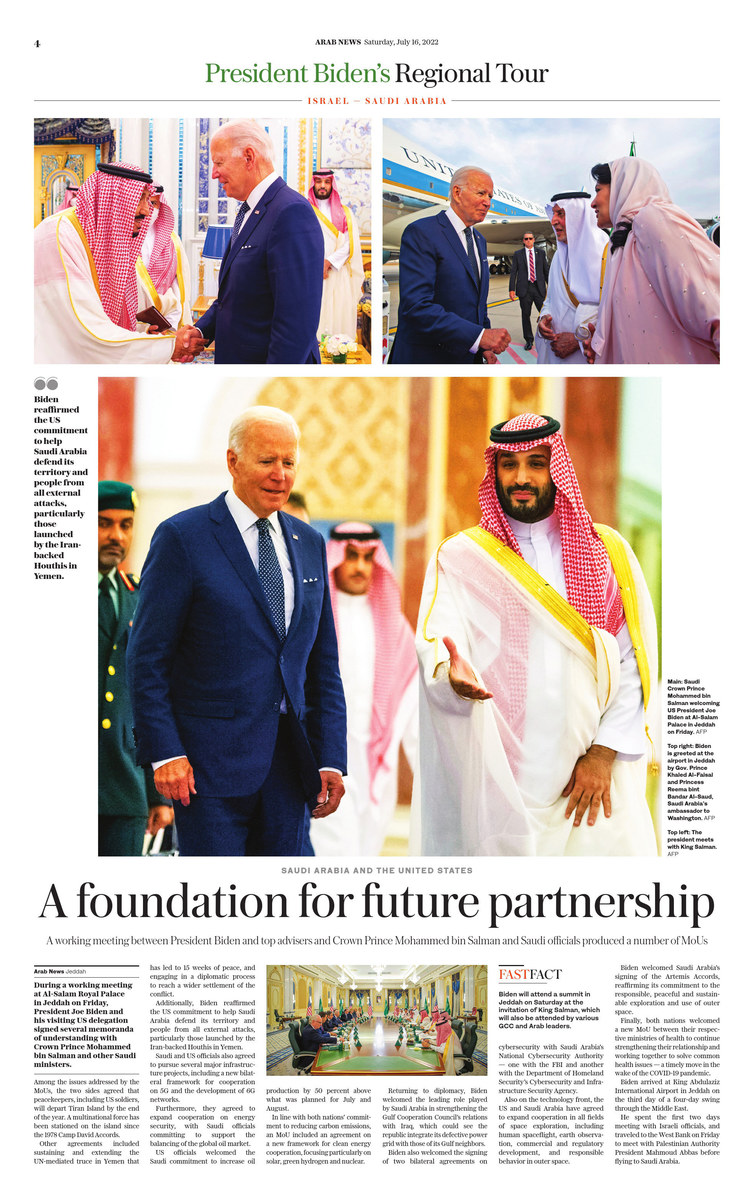JEDDAH: During a working meeting at Al-Salam Royal Palace in Jeddah on Friday, President Joe Biden and his visiting US delegation signed several memoranda of understanding with Crown Prince Mohammed bin Salman and other Saudi ministers.
Among the issues addressed by the MOUs, the two sides agreed that peacekeepers, including US soldiers, will depart Tiran Island by the end of the year. A multinational force has been stationed on the island since the 1978 Camp David Accords.
They also agreed to the opening of Saudi Arabia’s airspace to civilian aircraft flying to and from Israel.
Biden welcomed this “historic” step as an important move towards building a more integrated and stable Middle East.
Other agreements included sustaining and extending the UN-mediated truce in Yemen that has led to 15 weeks of peace, and engaging in a diplomatic process to reach a wider settlement of the conflict.
Additionally, Biden reaffirmed the US commitment to help Saudi Arabia defend its territory and people from all external attacks, particularly those launched by the Iran-backed Houthis in Yemen.
Saudi and US officials also agreed to pursue several major infrastructure projects, including a new bilateral framework for cooperation on 5G and the development of 6G networks.
Furthermore, they agreed to expand cooperation on energy security, with Saudi officials committing to support the balancing of the global oil market.
US officials welcomed the Saudi commitment to increase oil production by 50 percent above what was planned for July and August.
In line with both nations’ commitment to reducing carbon emissions, an MoU included an agreement on a new framework for clean energy cooperation, focusing particularly on solar, green hydrogen and nuclear.
Returning to diplomacy, Biden welcomed the leading role played by Saudi Arabia in strengthening the Gulf Cooperation Council’s relations with Iraq, which could see the republic integrate its defective power grid with those of its Gulf neighbors.
Biden also welcomed the signing of two bilateral agreements on cybersecurity with Saudi Arabia’s National Cybersecurity Authority — one with the FBI and another with the Department of Homeland Security’s Cybersecurity and Infrastructure Security Agency.
Also on the technology front, the US and Saudi Arabia have agreed to expand cooperation in all fields of space exploration, including human spaceflight, earth observation, commercial and regulatory development, and responsible behavior in outer space.
Biden welcomed Saudi Arabia’s signing of the Artemis Accords, reaffirming its commitment to the responsible, peaceful and sustainable exploration and use of outer space.
Finally, both nations welcomed a new MoU between their respective ministries of health to continue strengthening their relationship and working together to solve common health issues — a timely move in the wake of the COVID-19 pandemic.
Biden arrived at King Abdulaziz International Airport in Jeddah on the third day of a four-day swing through the Middle East.
He spent the first two days meeting with Israeli officials, and traveled to the West Bank on Friday to meet with Palestinian Authority President Mahmoud Abbas before flying to Saudi Arabia.


















